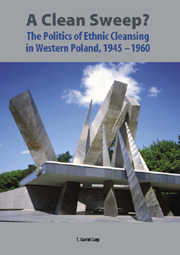Book contents
- Frontmatter
- Contents
- Acknowledgments
- Introduction: Hearts and Minds and Land: Ethnic Cleansing and the Stabilization of Postwar Poland
- 1 How the East Was Lost: Germany's Struggle for the Polish-German Borderlands, 1870–1945
- 2 Who Won the West: The Colonists and Ethnic Cleansers of Poznań and Eastern Brandenburg in 1945
- 3 Acts of Sacrifice: Poland's Ethnic Cleansing and the End of Political Pluralism, 1945–47
- 4 Counterrevolution from Above and Abroad: The Delocalization of Politics and the Beginning of Polish Stalinism's Antinational Counterrevolution, 1947–49
- 5 Waging Counterrevolution: The Party-State's Struggle for Hearts, Minds, and Land in Wielkopolska, 1949–53
- 6 Revolutions before the Revolution: National Solidarity and the Long Retreat of Stalinism in Wielkopolska, 1953–56
- 7 The Revolutions Betrayed? The Poznań Revolt and the Polish Road to Nationalist Socialism, 1956–60
- Conclusion: A Near Run Thing From National Solidarity to Solidarity
- Abbreviations
- Notes
- Bibliography
- Index
5 - Waging Counterrevolution: The Party-State's Struggle for Hearts, Minds, and Land in Wielkopolska, 1949–53
Published online by Cambridge University Press: 12 September 2012
- Frontmatter
- Contents
- Acknowledgments
- Introduction: Hearts and Minds and Land: Ethnic Cleansing and the Stabilization of Postwar Poland
- 1 How the East Was Lost: Germany's Struggle for the Polish-German Borderlands, 1870–1945
- 2 Who Won the West: The Colonists and Ethnic Cleansers of Poznań and Eastern Brandenburg in 1945
- 3 Acts of Sacrifice: Poland's Ethnic Cleansing and the End of Political Pluralism, 1945–47
- 4 Counterrevolution from Above and Abroad: The Delocalization of Politics and the Beginning of Polish Stalinism's Antinational Counterrevolution, 1947–49
- 5 Waging Counterrevolution: The Party-State's Struggle for Hearts, Minds, and Land in Wielkopolska, 1949–53
- 6 Revolutions before the Revolution: National Solidarity and the Long Retreat of Stalinism in Wielkopolska, 1953–56
- 7 The Revolutions Betrayed? The Poznań Revolt and the Polish Road to Nationalist Socialism, 1956–60
- Conclusion: A Near Run Thing From National Solidarity to Solidarity
- Abbreviations
- Notes
- Bibliography
- Index
Summary
The most characteristic graffiti was in the village of Pyzdre, in Wrzéień district and included the words: “I demand a Third World War, [that] America liberate us.”
—From a report of the Provincial Command of the UB in Poznań on January 7, 1952The party-state's efforts to Sovietize Poland were as socially and culturally revolutionary as they were antinationally counterrevolutionary. The local authorities, and much of the population, believed that the collectivization of agriculture was the key to Poland's Stalinization, particularly in Poznań. Unlike most of Poland, however, where the party-state pursued collectivization with a slowness akin to sabotage, the authorities set high, yet specific, goals for Poznań, which they aggressively strove to achieve. In the imagined community of struggle that the PZPR created between itself and the “village rich,” the party-state waged a highly coercive, economically disastrous campaign against the peasantry that crippled the region's agricultural development for decades to come.
The party-state's Stalinizing cultural revolution was conducted differently. The authorities endeavored to create a new, Sovietized vision of their country in which Poles “would not know hate, except hate towards the class enemy.” Three elements in this revolution were particularly important in Wielkopolska: the party-state's antireligious campaigns, the struggle to control education, and the regime's effort to replace “nationalism” and “chauvinism” with “Socialist patriotism.” Even though the course of this cultural revolution, like collectivization, varied considerably between the newly created province of Zielona Góra and Poznań, in both places it suffered from the authorities' inability to escape the legacy of nationalist activism that they themselves had fostered in the immediate postwar period.
- Type
- Chapter
- Information
- A Clean Sweep?The Politics of Ethnic Cleansing in Western Poland, 1945–1960, pp. 107 - 130Publisher: Boydell & BrewerPrint publication year: 2006



